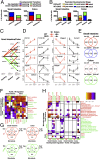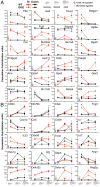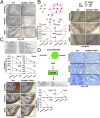Analysis of gene-environment interactions in postnatal development of the mammalian intestine
- PMID: 25691701
- PMCID: PMC4343130
- DOI: 10.1073/pnas.1424886112
Analysis of gene-environment interactions in postnatal development of the mammalian intestine
Abstract
Unlike mammalian embryogenesis, which takes place in the relatively predictable and stable environment of the uterus, postnatal development can be affected by a multitude of highly variable environmental factors, including diet, exposure to noxious substances, and microorganisms. Microbial colonization of the intestine is thought to play a particularly important role in postnatal development of the gastrointestinal, metabolic, and immune systems. Major changes in environmental exposure occur right after birth, upon weaning, and during pubertal maturation into adulthood. These transitions include dramatic changes in intestinal contents and require appropriate adaptations to meet changes in functional demands. Here, we attempt to both characterize and provide mechanistic insights into postnatal intestinal ontogeny. We investigated changes in global intestinal gene expression through postnatal developmental transitions. We report profound alterations in small and large intestinal transcriptional programs that accompany both weaning and puberty in WT mice. Using myeloid differentiation factor 88 (MyD88)/TIR-domain-containing adapter-inducing interferon-β (TRIF) double knockout littermates, we define the role of toll-like receptors (TLRs) and interleukin (IL)-1 receptor family member signaling in postnatal gene expression programs and select ontogeny-specific phenotypes, such as vascular and smooth muscle development and neonatal epithelial and mast cell homeostasis. Metaanalysis of the effect of the microbiota on intestinal gene expression allowed for mechanistic classification of developmentally regulated genes by TLR/IL-1R (TIR) signaling and/or indigenous microbes. We find that practically every aspect of intestinal physiology is affected by postnatal transitions. Developmental timing, microbial colonization, and TIR signaling seem to play distinct and specific roles in regulation of gene-expression programs throughout postnatal development.
Keywords: innate immunity; intestine; microbiota; ontogeny; postnatal development.
Conflict of interest statement
The authors declare no conflict of interest.
Figures




References
-
- West-Eberhard MJ. Developmental Plasticity and Evolution. Oxford Univ Press; Oxford, UK: 2003.
-
- Brandtzaeg P. The gut as communicator between environment and host: immunological consequences. Eur J Pharmacol. 2011;668(Suppl 1):S16–S32. - PubMed
-
- Walker WA. Initial intestinal colonization in the human infant and immune homeostasis. Ann Nutr Metab. 2013;63(Suppl 2):8–15. - PubMed
Publication types
MeSH terms
Substances
Grants and funding
LinkOut - more resources
Full Text Sources
Other Literature Sources
Molecular Biology Databases

